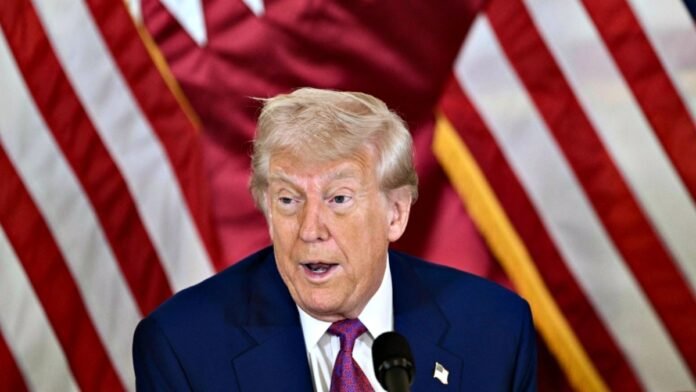
Key Points:
- Donald Trump faces mounting opposition over National Guard deployment.
- Declared a “crime emergency” in Washington DC, hinting at expansion to other cities.
- Signed executive order to form a special National Guard unit with federal law enforcement powers.
- Removed Federal Reserve Governor Lisa Cook over alleged mortgage fraud scandal.
- Tariff war backlash: Trump’s 25% tariffs on India and tough stance on China spark domestic unrest.
Washington D.C.: Amid rising crime and protests across the country, US President Donald Trump has tightened law-and-order controls in Washington DC by calling in the National Guard. During a fiery press conference on Monday, he declared a “crime emergency”, authorizing additional military-style deployment in the capital.
Trump warned that if unrest spreads, similar measures could be extended to other cities, with Chicago Illinois’ largest city already under close observation.
“My duty is to protect Americans. This is not dictatorship. This is law and order,” Trump clarified, countering opposition charges.
Executive Order: Special Guard Unit to Enforce Federal Law
Trump on Monday signed an Executive Order authorizing Defense Secretary Pete Hegseth to create a special National Guard unit, dedicated to ensuring “public safety” in Washington.
This new unit will:
- Be specially trained for urban law enforcement.
- Be authorised to enforce federal law (a controversial move criticized by Democrats).
- Be on standby for deployment across the country at short notice.
Analysts warn this move blurs the separation of civilian policing and military authority, intensifying fears of creeping authoritarianism.
Trump Removes Federal Reserve Governor Lisa Cook
In another dramatic development, Trump fired Federal Reserve Governor Lisa Cook on Monday via his social platform Truth Social. Cook, who was appointed in 2022 by former President Biden, faced allegations of mortgage fraud dating back to a 2021 property purchase in Michigan.
According to Federal Housing Finance Agency (FHFA) director Bill Pulte, Cook falsely claimed a property as her “primary residence” to qualify for a 15-year mortgage. DOJ attorneys reportedly backed calls for her removal after reviewing complaints.
Trump had publicly warned Cook to resign voluntarily by August 22, or face dismissal. Four days later, he followed through.
Economists and Democratic leaders have blasted Trump’s decision, warning it could undermine the independence of the Federal Reserve and rattling Wall Street confidence.
Tariff War Fallout: Rising Costs for Americans
While intensifying attacks on China with abrasive language, Trump has also imposed a 25% additional tariff on imports from India starting August 27. His trade war rhetoric boasting about “destroying” China has pleased his voter base but created economic shock domestically.
- Imported goods from India and China are becoming significantly more expensive in the US.
- American households are paying higher prices, triggering widespread discontent.
- Economists warn these tariffs could backfire by inflating living costs and squeezing small businesses.
The Democratic Party and several business lobbies have strongly opposed Trump’s tariff strategy, branding it “economic self-sabotage.”
Political Storm Intensifies
Trump’s law-and-order crackdown, his aggressive trade policies, and the unprecedented removal of a Federal Governor are collectively fueling the political firestorm in Washington.
While his supporters hail him as a strong leader tackling crime and corruption, opponents argue that Trump is pushing America toward authoritarian rule, with decisions that sideline democratic institutions.
The situation now hangs in balance as:
- Chicago braces for potential Guard deployment.
- The Federal Reserve scrambles to stabilize credibility.
- US citizens face rising living costs due to tariffs.



















































